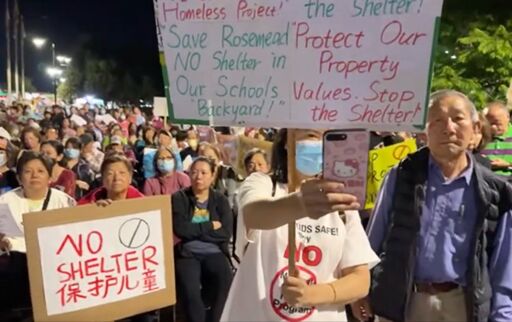Last month, hundreds of immigrant Chinese residents from the San Gabriel Valley just east of Los Angeles turned up outside a meeting of the Rosemead City Council. Many of them were wearing Donald Trump campaign apparel. They were there to protest the expansion of temporary shelters for single mothers facing domestic violence. A local far-right California State Assembly candidate, the Taiwanese American lawyer Long David Liu, had helped to mobilize the protesters. Many showed up just because they learned about the supposed dangers of the project circulating on the Chinese messaging app WeChat.
I was among a smaller group of counterprotesters rallying in support of the shelter proposal. We were outnumbered, surrounded, and harassed for hours by majority-Cantonese-speaking protesters. I was the only Cantonese speaker on our side, and I tried my best to reason with people even as some accused me of bringing in crime and endangering our communities. Our allies attending the city council meeting were eventually able to pass the measure, but only after a night of debate until four in the morning. They were also heckled by the protesters as they departed.
This type of right-wing mobilization by immigrant Chinese residents is not new in the San Gabriel Valley—the largest ethnoburb (a suburb with a large concentration of an ethnic minority group) for Chinese and other Sinophone diaspora in the nation. Temple City residents organized to successfully stop a proposal to convert a local motel into a shelter for the unhoused in 2017, followed by a similar outburst in the adjacent city of Arcadia in 2021. Protests have also sprung up in other immigrant Chinese communities nationwide. Earlier this summer, the first Chinese American New York City Council member from Brooklyn, Susan Zhuang, led a demonstration against emergency shelters for the unhoused in the ethnic enclave of Bensonhurst. Last year, Chinese residents in Brighton Park on the South Side of Chicago rallied against a planned migrant shelter.
These incidents reflect a dangerous trend in national politics: the growth of an organized Chinese American far right pushing for exclusionary policies around housing and increased policing in the name of “public safety,” which both the Democratic and Republican politicians are keen to support. And these communities are not just protesting—they’re also voting. Many heavily Chinese American areas shifted sharply to the right in the recent presidential election.
[…]
Interesting stuff… but why single out Chinese communities? The right-wing conservative sphere is growing worldwide, among every demographic, and definitely bigger and stronger in more religious communities.
Arguably strictly Catholic immigrants from Mexico/South America are more likely to be right-wing, too.
Immigrants from India bring their caste system bullshit with them. It’s become kind of notorious in Seattle. So much so that they had to make a local law to ban caste discrimination.
So, again… why single out Chinese right-wing attitudes?
(“Because people don’t expect Chinese immigrants to be especially right-wing” is probably a valid answer.)
I wouldn’t say they single out a community, they’re just covering a story on that particular issue. There are a lot of stories about right-wing (and left-wing) topics, this is just one of them I would say.
What is far right?



